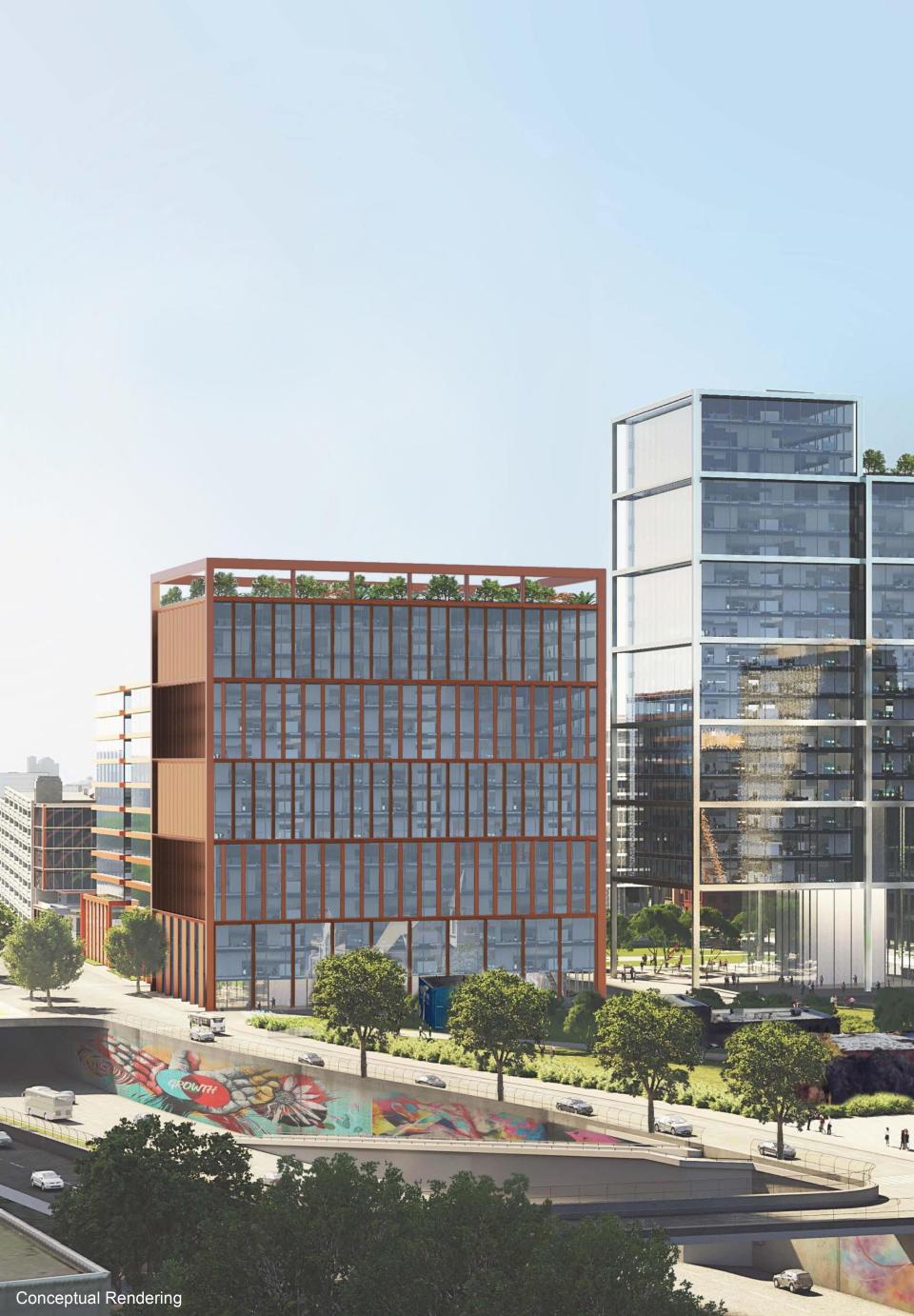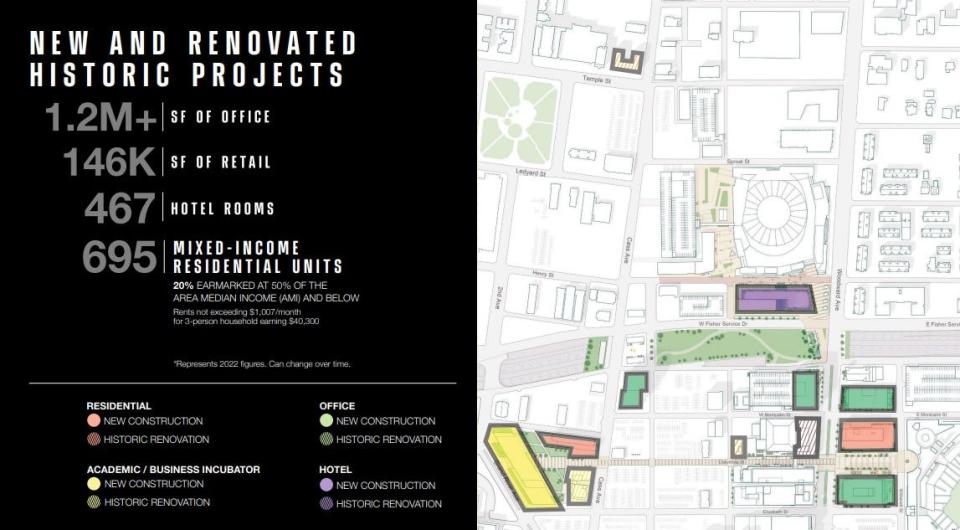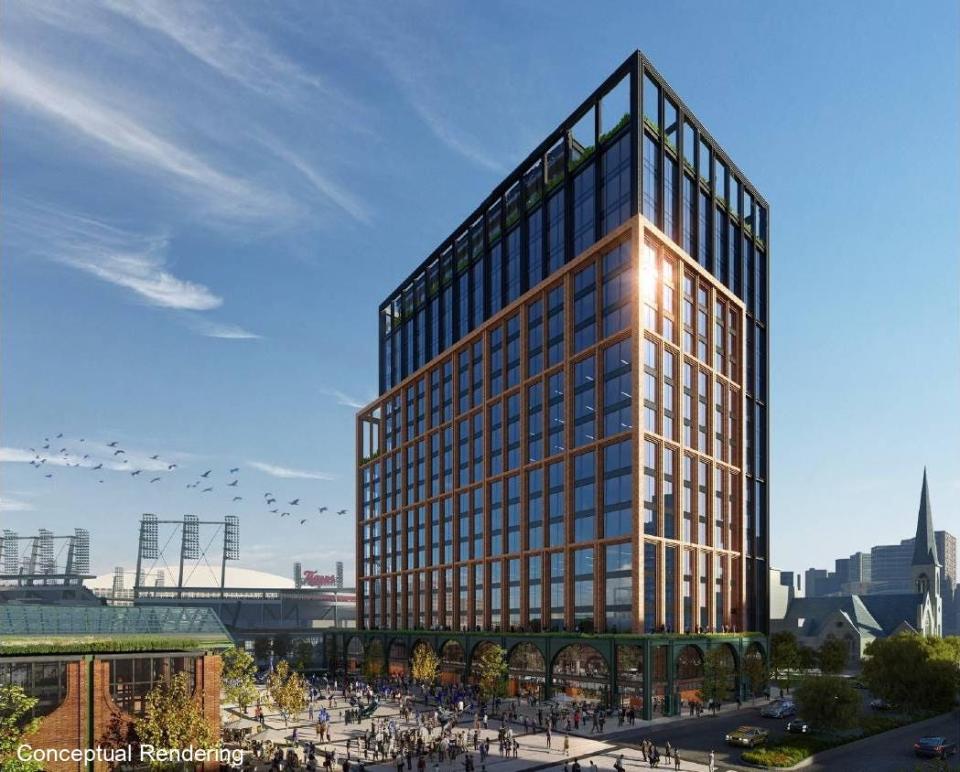District Detroit brownfield plan gets final OK from Michigan development officials
State development officials gave a final approval Tuesday to the biggest development incentive for the $1.5 billion District Detroit project, clearing the way for the first of the 10 planned new buildings and rehabs to break ground in downtown this summer.
Members of the quasi-public Michigan Strategic Fund in Lansing voted unanimously in favor of the Transformation Brownfield incentive, which would allow the project's developers to capture up to $615 million in future local and state-level tax revenues generated by the project over 35 years.

Last month, Detroit City Council voted 8-1 for the Transformational Brownfield, with the only nay vote from Council President Mary Sheffield.
The co-developers of District Detroit are the Ilitch organization's Olympia Development of Michigan and New York megadeveloper Stephen Ross' The Related Cos.
The vote Tuesday was preceded by a lengthy public comments period. More than two dozen people voiced opposition to the $615 million incentive and a half dozen or so spoke in support.
“If you approve this deal, you will be robbing Detroit's neighborhoods to stuff the pockets of billionaires," one opponent, Detroiter William Hickey, said during public comments.
The city of Detroit's top economic and workforce development officer, Nicole Sherard-Freeman, emphasized that there would be no Transformational Brownfield tax revenues for the developers to capture if they don't build the project.
"No development, no abatements. So these are performance-based incentives," she told the Michigan Strategic Fund board.

The project calls for 10 new or rehabilitated buildings in and around downtown Detroit, including 1.2 million square feet of new office space, nearly 700 new apartments and two new hotels. Twenty percent of the apartments must be set aside for those with lower incomes, who could use Section 8 vouchers.
Jobs creation
A third-party economic forecast anticipates the project directly creating 12,450 temporary construction jobs and about 6,000 new permanent jobs, so long as the buildings fill up promptly with residential and commercial tenants.
More: District Detroit, Gilbert projects shielded with secrecy as public denied access to data
More: Fuller details on $1.5B District Detroit buildout as it nears big vote
The 10 empty or undeveloped sites currently generate $249,000 a year in city tax revenue. Once all 10 are built and occupied, the forecast anticipates $12.2 million a year in new net tax revenue for Detroit and $28.5 million a year in new net tax revenue for the state.
Moments before Tuesday's vote, Michigan Strategic Fund board member Ronald Beebe asked whether the Transformational Brownfield program has any "clawback" mechanism should the developers fail to create all the anticipated jobs.
A development official replied that there is no clawback and "there will not be long-term monitoring of job creation."
Other incentives
Other incentives for the District Detroit project besides the $615 million Transformational Brownfield include:
$133 million in city tax breaks: Those tax revenues would otherwise be captured by the Downtown Development Authority, or DDA.
$25 million cash reimbursement from the DDA for the cost of infrastructure improvements, including road and utility upgrades and creating public spaces.
A $23.7 million forgivable loan from the DDA to support the construction of deeply affordable housing in the development.
3rd Transformational Brownfield
District Detroit is now the third development project to win approval for the state's Transformational Brownfield program. The first project, approved in 2018, was for development or redevelopment of four downtown Detroit buildings by Dan Gilbert's Bedrock firm. The second, in 2019, was for redevelopment of an abandoned paper mill in Vicksburg, Michigan, as commercial and residential space.
The Transformational Brownfield program has a $1 billion lifetime cap on total incentive awards. After District Detroit's approval, there is just over $200 million still available, according to development officials.
A representative for the developers said they expect to break ground in late summer on the first new building in District Detroit, a 17-story office building at 2200 Woodward in front of Comerica Park.

A separate but related development is the planned $250 million University of Michigan Center for Innovation, or UMCI, which is to break ground later this year in downtown.
The UMCI would offer U-M graduate education as well as local workforce development. Funding for the center would come from the state ($100 million), a donation by Stephen Ross ($100 million) and U-M fundraising ($50 million).
6 new buildings in District Detroit:
2250 Woodward: A 20-story building to go next to Comerica Park and contain 287 apartments (20% set aside as "affordable"), 27,000 square feet of ground-floor retail space and a new underground parking garage with 206 spaces. Development cost: 217 million.
2205 Cass: An 18-story residential building with 261 apartments (20% affordable) and 8,750 square feet of retail space that would be part of the Detroit Center for Innovation campus. Development cost: $148 million.
2200 Woodward: A newly constructed 17-story office building with ground-floor retail next to Comerica Park, plus a new underground parking garage with 298 spaces. (It would share the same parking garage 2250 Woodward). Development cost: $321 million.
2305 Woodward or 2300 Cass: Two locations under consideration for an all-new, 22-story office building with ground-floor retail. Development cost: $283 million.
2300 Woodward: A new five-story office building with ground-floor retail. Development cost: $82 million.
Hotel next to Little Caesars Arena: A newly constructed 14-story, 290-room hotel next to Little Caesars Arena at 2455 Woodward. Although the building was originally announced last June as an Equinox Hotel, the actual brand of hotel has yet to be determined. Development cost: $192 million.
4 rehabs in District Detroit:
408 Temple St.: The long-empty Fort Wayne/American hotel near the Masonic Temple would be redeveloped as an 11-story apartment complex with ground-floor retail. There would be 131 apartments, with 20% affordable. Development cost: $69 million.
2210 Park Ave.: Redevelopment of the old 10-story Detroit Life Building into 16 apartments with ground-floor retail. Development cost: $24 million
2115 Cass: Adaptive reuse of the former Moose Lodge building into a four-story business incubator as part of the Detroit Center for Innovation campus. Development cost: $55 million
Fox Hotel: Adaptive reuse of the 10-story Fox Theatre office building at 2211 Woodward to become a 177-room Fox Hotel. The project will not alter the Fox Theatre. Development cost: $123 million.
Source of $615 million in Transformational Brownfield captures:
Incremental local property taxes — 30 years
Construction materials — 100% sales tax exemption
Construction labor — 100% state income tax capture
Permanent employees — 50% state income tax capture for 20 years
New residents — 100% state income tax capture for 20 years
Contact JC Reindl: 313-378-5460 or jcreindl@freepress.com. Follow him on Twitter @jcreindl.
This article originally appeared on Detroit Free Press: Michigan officials give final OK to District Detroit brownfield plan
